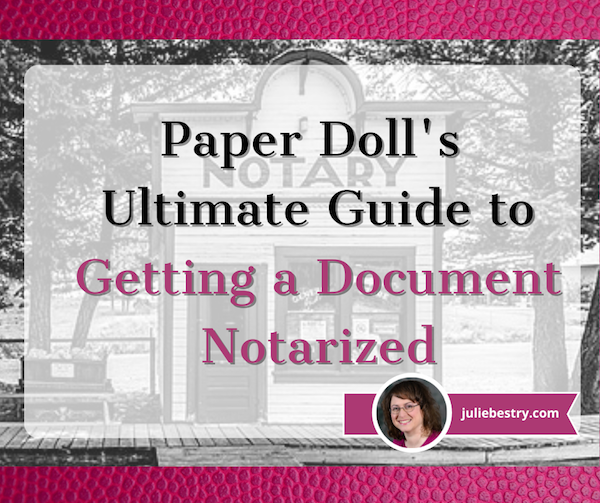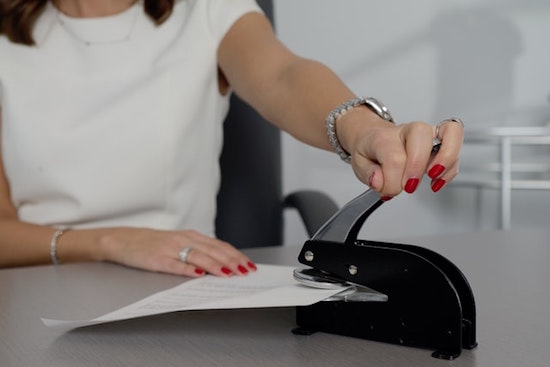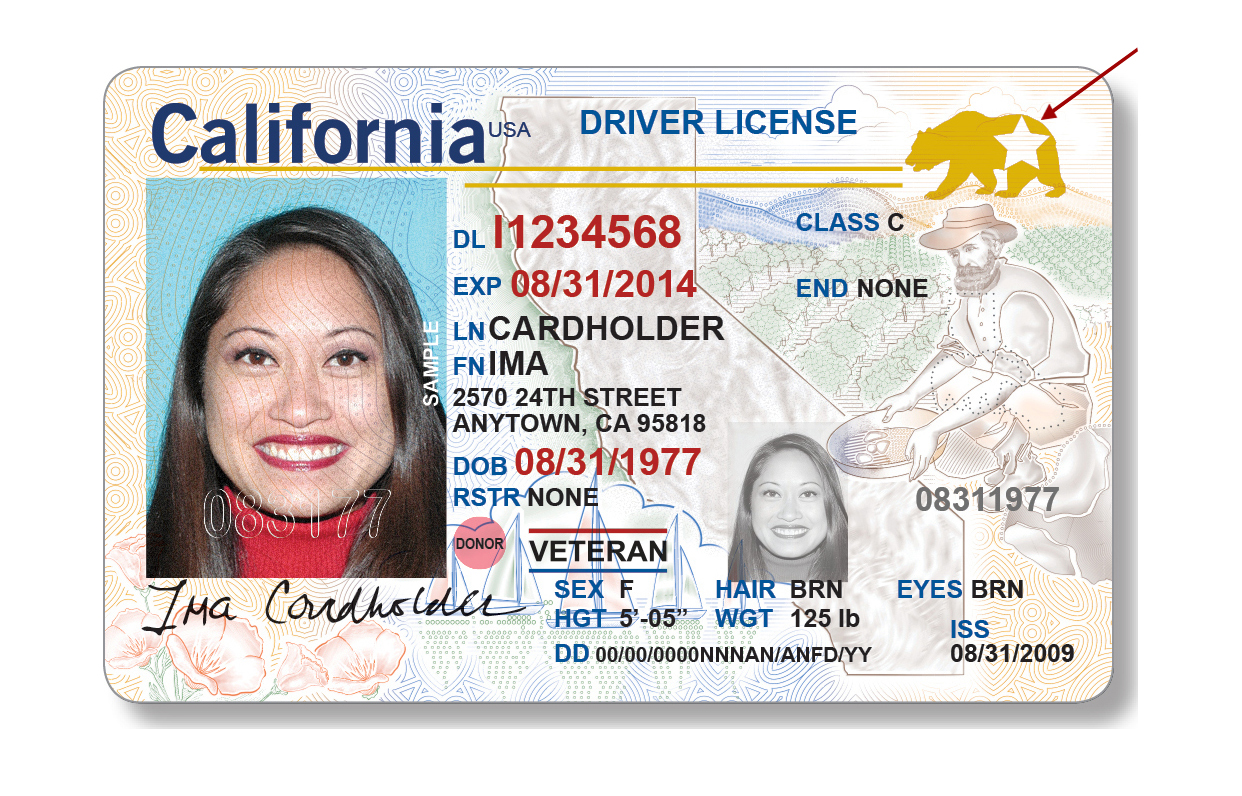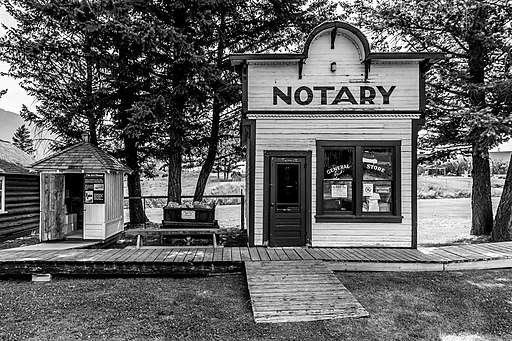Paper Doll’s Ultimate Guide to Getting a Document Notarized

When I was little, I thought a notary public was “Note of Republic.” After all, the concept of [“thing] of [location]” is a known form of expression. Consider Governor of Minnesota, Justice of [the] Peace, or Man of La Mancha. I figured “Note of Republic” meant that it was a document related to our country.
C’mon, it’s weird to hear “public” after a word. We have Certified Public Accountants, not Certified Accountants Public! We’re used to public school, public pool, public park, public relations. What the heck, I wondered when I first saw the expression properly written, was a notary?
Yes, I’m a grownup now, and (mostly) understand what notaries do, but unless you have used a notary’s services or are a notary yourself, you might wonder how it all ensures your legal documents are organized and squared away.
WHAT DOES A NOTARY DO?

Notary Stamp by Stephen Goldberg on Unsplash
According to the State of Tennessee (where Paper Doll resides), a notary public is:
a person of integrity who is appointed to act as an impartial witness to the signing of an important transaction and to perform a notarial act, which validates the transaction. A notary’s primary purpose is to prevent fraud and forgery by requiring the personal presence of the signer and satisfactorily identifying the signer.
Let’s look at how those elements come into play:
- a person of integrity — The rules vary by state, but generally, you have to be at least 18 years old, a citizen of the United States (though in some states, you need only be a permanent resident), either reside in the state or operate a business in that state, and be able to read and write in English.
You also have to submit an application and purchase a notary surety bond, which is like an insurance policy in that it protects the public in case a notary makes a grievous error.
As you might guess, people with felony records would not fall under the “person of integrity” definition and can’t become notaries. However, while we can all imagine various failures of integrity (bullying, gossiping, cheating at Scrabble), those don’t generally prevent someone from becoming a notary.
- act as an impartial witness — notaries can’t notarize their own signatures, transactions in which they are participants, or documents for their family members or friends.
- requiring the personal presence of the signer — until recently, “personal presence” was literal, but as we will see later, a virtual presence is sometimes an option.
- satisfactorily identifying the signer — this involves the signer being able to provide documents that prove identity.
WHAT ARE THE DIFFERENT TYPES OF NOTARIZATION?
If you’ve never had to get something notarized before, you may assume that there’s just one kind of notarization, where the notary says, “Yup, I’m acknowledging that I just saw you sign this thing.” But it’s more complicated than that.
There are main three types of notarizations:
1) Acknowledgements — The notary is saying, “OK, I just saw this person [verified as the lovely Ms. Nell Fenwick] sign this document willingly; there was no mustache-twirling Snidely Whiplash threatening to tie this person to the railroad tracks if they didn’t sign over the rights to their goldmine.” (What, don’t tell me you never watched Dudley Do-Right!)

There are some essential elements here:
- The signer (that’s Nell) has shown up in front of the notary.
- The notary has been able to positivity identify the person is actually Nell (according to the individual state’s regulations).
- The signer has either signed the document before showing up or must sign it in the notary’s presence.
- The signer has to be able to communicate directly to the notary that the signing is willingly done, at least in 49 states. However, in Arizona, the law allows signers to communicate their willingness to the notary through a translator.
(Also, for the purposes of this blog post, Nell and Snidely are in the United States, not Canada where the cartoon takes place. With apologies to my international readers, non-US notary regulations were far too complex to include in today’s post!)
The notary is required to make sure that the individual understands what the document is and what it means and what the consequences are, in addition to being willing to sign and not under any appearance of being coerced.
Obviously, notaries are not mind-readers; they can’t be certain a person isn’t in an emotionally abusive relationship or having their loved one held for ransom, but a notary can refuse to notarize a document if something seems seriously hinky. The notary can ask all sorts of questions, ranging from the kinds of questions first responders ask accident victims to those of a more legal nature. If the signer appears drunk or under the influence of dugs, or to be suffering from dementia or is otherwise seems cognitively, the notary can (and must) decline to notarize the document.
Acknowledgments are used when you’re getting any of a variety of documents signed, like a contract, a Power of Attorney, or a last will and testament.
2) Jurats — This old-timey, legalese expression (also known as “verification upon oath or affirmation” means that the signer is swearing (or affirming) to the notary that the contents of document they are signing are true.
- As a signer, you must show up and sign the document in front of the notary.
- In many (but, to Paper Doll‘s surprise, not all) states, the notary must verify the signer’s identity.
- The notary administer’s a verbal oath (or affirmation) and the signer must respond aloud* in such a away as to confirm mutual understanding. No nods or thumbs-up are allowed.
*I tried to find verification of what is required if the signer is deaf or is not able to speak, and while there don’t seem to be uniform answers, I was able to learn that communication through a translator or sign interpreter is not enough, though the notary and signer are allowed to communicate in sign language, via writing notes on paper, or typing on a computer, tablet, or cell phone, as long as they are in one another’s presence.
In theory, signers are supposed to raise their right hands while making the oath or affirming (just like in a courtroom), but it’s not required by law. (It’s just to make it obvious that this is more serious, legally speaking, than telling your college roommate’s mom that your roommate is in the shower she’s actually sleeping at her boyfriend’s dorm.)
The idea of an oath or affirmation may ring a bell if you’ve watched a lot of courtroom dramas and have heard, “Do you solemnly swear…”
In brief, an oath is a pledge before a religious entity. As some faiths do not allow oaths to be taken in civil settings, and as some people do not adhere to religious precepts, individuals get a choice. For more on the difference, the National Notary Association has made a short video to explain:
A jurat is used when you must notarize testimony. Imagine you are asked to notarize your statement that you witnessed Ms. Lucy Van Pelt promise not to pull the football away from Mr. Charlie Brown but then she pulled the football away, causing him to kick at the air, fall on his back, and complain of seeing stars.
There are different forms or certificates that notaries use for each notarization, whether acknowledgements or jurats. Generally, an acknowledgment certificate will say something like “acknowledged before me” (where “me” is the notary), while the jurat certificates will say something like, “subscribed and sworn to (or affirmed) before me.”
3) Copy certifications — This is when a notary confirms that the copy of a document is an exact match to the original version. Not all states allow this type of notarization.
Notaries can also provide other services. They can administer oaths, like those given to people deposed in legal depositions. (Notaries can’t administer oaths of office for government service or in a military setting, though.) In Maine, South Carolina, and Florida, they can also perform marriage ceremonies!
Pretty much any kind of document can be notarized except for government vital records documents, like birth and death certificates, or marriage certificates. Notaries aren’t allowed to notarize, make, or certify copies of these; instead, you have to go to the appropriate government agency to get certified copies. For more on that, see Paper Doll‘s post from last year, How to Replace and Organize 7 Essential Government Documents.
HOW CAN YOU PREPARE TO GET SOMETHING NOTARIZED?
First, be sure you know exactly what you need to get notarized and fill in all of the blank spaces (except, as applicable, the signature line).
Next, make an appointment with a notary. While you can sometimes show up at a notary’s office, you wouldn’t want random people showing up to your place of work, unannounced, and have to squeeze them in. Be cool, dude.
Verify the fees you’ll be paying and ask how the notary accepts payment. Notary fees differ by state and notarization type, are set by law for most states, so you can check with your state’s Secretary of State’s office for the basic fees; however, notaries can charge separate fees for travel and for remote services.
Notaries at banks may not charge anything for the service, and notary at companies (like the UPS Store) may allow any of the payment methods the company already accepts for other services. But self-employed notaries are allowed to make up their own payment policies, and might require payment by cash or check; don’t assume they’ll take Venmo.

Bring your photo ID. Remember, the notary’s job is, in part, to verify that signers are who they claim to be, and that can’t be done if the signers do not present valid ID. Usually, a government-issued ID with a photo, like a driver’s license or password, is required.
If someone lacks legal identification, the situation isn’t impossible, but it’s fraught. For example, let’s say that Grandpa is in an assisted living facility, hasn’t driven in a decade, and doesn’t have a passport or a government issued photo ID. In many states, the signer can call upon “credible identifying witnesses,” people willing to swear to the notary that they know Grandpa and that he is who he says he is. But Grandpa’s witnesses are going to have those required forms of identification.
Speaking of ID, make sure the name on your ID matches the name you’re using on the documents you need to have notarized. If you’ve recently gotten divorced and have returned to your “maiden” name, or have married and taken your spouse’s name or hyphenated your names, you’ll need to show ID that reflects that change.
Make sure everyone who needs to sign is available for the appointment. (If someone in your family always shows up late, you might want to “accidentally” tell them a slightly earlier time — or drive them yourself!)
Know what the heck you’re going to be signing and what it means. The notary has to make sure that the signer is willing to sign and fully aware of what they’re signing. Paper Doll shouldn’t have to tell you this, but don’t show up at the notary’s office after a boozy brunch. (In the case of Grandpa, above, you might want to warn him that the notary might ask some questions to make sure he’s mentally alert and not signing under duress, so he’s not offended by the questions.)
Be prepared to sign the notary’s log book, which is also known as a public journal. Most states require that notaries keep a log book or journal of all the notary-related acts they perform. It covers all the nitty-gritty details of the transaction, so if a notarized document goes missing, gets stolen or altered, or anything becomes a matter of legal dispute, the record can be set straight. Plus, it keeps everything so nice and organized.
A few years ago, a friend contacted me and asked if I would serve as a witness so that her elderly mother could get some documents signed and notarized. In addition to having to sign my name on the various documents as a witness, I had to sign the notary’s log book/journal, provide my photo ID, write my driver’s license ID number, and provide my thumbprint (which was less messy than I expected, but made me feel like a character on Law & Order).
WHERE CAN YOU FIND A NOTARY?

Photo by Matthias Süßen, CC BY-SA 4.0 , via Wikimedia Commons
You may assume that because any notary can notarize your document that any notary will, but that’s not the case. For example, several years ago I needed to sign a document for Paper Mommy and have my signature witnessed and notarized.
Most banks provide notary services, and I was delighted to see that Bank of America provides fee-free notary services. So, I went to Bank of America, where I had both personal and business accounts, but once they saw that it was a Power of Attorney document, I was told that bank employees were not allowed to notarize it, as a matter of company policy.
In the end, I got my signature notarized at the UPS Store just up the block from the bank. It felt odd to be getting a legal document notarized next to people buying bubble wrap and making Amazon returns, but the process was quick and easy, and the fee was reasonable.
In addition to banks and credit unions, you may be able to find notary services at any of the following:
- Law firms — Sometimes paralegals and legal secretaries are notaries, and the process will be faster than trying to see an attorney-notary.
- Real Estate firms — Call your agent; if you’re a renter, ask your friends if any of them loved their real estate purchase experience and how they got documents notarized.
- Accountants — You may be out of luck if you file your taxes with H&R Block or TurboTax, but if you have a relationship with an accountant (and aren’t pestering her during tax season), you might get lucky.
- Package shipping stores like the UPS Store (hey, it worked for me) and FedEx Office (which they offer through a virtual service, of which there’s more below)
- AAA — Most regional AAA offices provide free notary services as part of membership. However, AAA can’t notarize business contracts, mortgages, or wills; if you’ve got to notarize an auto sale, Power of Attorney documents, trusts, or affidavits, though, you’ll be fine. You can’t always make appointments at AAA, so you may end up sitting in the lobby for a while until it’s your turn.
- Public libraries — Many library systems have notaries on staff; you may have to go to a branch that is not where you usually borrow, so call to verify which branches have notaries available. The notaries at your library may be limited as to which documents they can notarize; mine can notarize sworn statements, Power of Attorney documents, rental agreements, copy certifications, and more, but can’t notarize real estate transactions, wills, divorce papers, employment verification forms, Homeland Security I-9 Forms, or documents in languages other than English.
- Colleges — If a member of your family attends a college or university, call the bursar’s office. They’re likely to have someone on-staff with notary credentials or will know where to go.
You can also find notaries the old-fashioned way, by searching the Yellow Pages, using a search engine (e.g., type “notary services [your town]” into Google), or searching statewide notary databases.
Weirdly, there does not seem to be a database of notary databases (which feels awfully disorganized of them), so you’ll have to search for your state’s database through a search engine or by looking at your state’s Secretary of State website.
You don’t have to go to the notary; notaries will come to you!
Over the last few decades, mobile notaries have become a thing. The same notaries whom you can visit for services may provide mobile notary services for an additional fee. Type “mobile notary near me” into your favorite search engine.
As I mentioned earlier, when a friend needed to have her mother’s documents signed, witnessed and notarized, my experience as a professional organizer (and resource researcher) came in handy, and I was able to recommend a wonderful Chattanooga notary public. While there was an additional fee for him to travel to my friend’s location, it far outweighed the inconvenience (and likely impossibility) of getting her elderly and infirm mother to the notary’s office.
Thus, you’ll want to weigh the cost of us using a mobile notary against the convenience of having someone come to you.
WHAT IF YOU CAN’T GET TO A NOTARY (AND ONE CAN’T GET TO YOU)?
A notary can’t just notarize a person’s signature over the phone or Zoom. I know. Bummer.
That said, as a result of lessened bureaucracy due to the COVID pandemic, there’s Remote Online Notarization, or RON. (No, not Ron Weasley from Harry Potter, though it really does seem pretty magical.)
Remote online notarization companies connect a signer with commissioned notaries public (yes, that’s the official plural of notary public, like attorneys general or culs-de-sac) who are authorized to notarize documents remotely via a webcam.
When I originally started researching this post, 24 states allowed notaries to do RON; 24 had temporary regulations allowing it during COVID, and two had weird limits. Then Connecticut rescinded authorization but ten more states made it permanent. But last week, the House of Representatives passed the Remote Online Notarization Bill, which (assuming it passes the Senate) should make secure online remote notarization much easier to access.
Two of the best known remote online notarization service providers are Notarize and NotaryCam.
First up, Notarize.
Who knew notarization could be so funny?
Download the iOS or Android version of the Notarize app or use your computer’s browser. Then snap a photo of the document and upload it (or upload a PDF, or drag-and-drop the document onto the computer’s browser). Then provide your proof of identity, and connect to the notary via the platform’s webcame. Pricing for individuals starts at only $25.
NotaryCam is similarly priced at $25 (or $79 if you’re outside the US). Your document has to be a PDF, and while you can use a Mac or PC, if you don’t want to fiddle with plugins, use Chrome or Firefox. When mobile, iOS is fine but NotaryCam sounds pretty iffy about using Android.
Both platforms are secure, legal, and operate 24/7/365. For what it’s worth, NotaryCam seems oriented more toward real estate and other professionals than toward consumers; Notarize is a little more intuitive and aimed toward both a Regular Joe consumer audience as well as professional.
Have you ever had adventures in getting something notarized? Please feel free to share in the comments.
Finally, now that you’ve made it through this master class in notarization, you deserve a little fun. If you watch to the end, you’ll find that Inspector Fenwick of the Royal Canadian Mounted Police could have used the services of a notary to figure out who was whom!




Paper Doll, your ability to make the mundane fascinating knows no bounds! Who’da thunk that the Note of Republic was a fun and noble calling? You! That’s who.
I went to my bank to get a document notarized this year. I made my appointment, waited in line for an available teller, and they gave me a nice new blue ink pen. I was *supposed* to have brought my own witness with me, but delivering a dashing smile to the woman behind me in line solved that problem. So much ado over a stamp…
LOL, documents don’t make the most exciting of topics unless you’re writing about treasure maps, but I’m delighted to know I’m making these topics fascinating! Thank you!
And how do they not tell us these rules? Are we just supposed to absorb these rare lessons by osmosis?
Thanks for the thorough post. Very interesting stuff. I knew a little about notary and getting notarized documents because I had to do it for volunteering at my kids’ school and tasks for my parent’s estates. It’s not a fancy topic but it is super important to understand. I will be sharing this one.
Thanks for your kind words. I think we suddenly reach an age where we’re expected to know these “bonus” grownup things, either to get a mortgage or create estate documents, and nobody gives us any prep!
I learned a few things and had a good laugh also.
Well, you are the inspiration for all the silliness, Paper Mommy!
Over the years I have had many things notarized and, like the others, never thought it a fun topic to explore but you have made this fun and interesting!
Awwww, thank you. My brain makes weird connections, and as I was doing the research, vaguely recalled the time there were three Nell Fenswicks due to Snidely and Dudley, and it all sort of morphed from there. (I suppose this would have also made for a possible identity theft tie-in, but notarization got there first.)
Julie,
What an interesting article. I have to be honest I didn’t realize there were three types of notaries. Thanks for the info and the flashback for Dudley Do-Right! 🙂
In addition to the three ways something can be notarized, there are also specialty notaries; most well-known are specialists in handling the title signatures for real estate companies. These mobile notaries are hired by the real estate company, and they’ll come to your home, walk you through the whole process, oversee notarizing, and then hand-deliver the paperwork to the title company or real estate agent. It’s amazing the stuff that exists that nobody tells us!
Figures that CT was one of the states that rescinded RON! I hope it passes the senate because it can be difficult to find one in person. My daughter just had to go through this for a document. She ended up at a bank, but it was a very long wait.
Some libraries have a notary on staff, which is also so helpful.
I have to say that after reading this, being a notary feels like a big responsibility. Not sure I would be comfortable with this job, but am thankful that this is a service some are willing to provide. Identity thefts and other criminals have become so adept that I think we all feel like sitting ducks.
Great post on a subject I’ve given very little thought to.
Oh, Seana, I’m so sorry your daughter had to deal with this.
And yes, I feel the same way you do about this level of responsibility. When I first started my professional organizing business, knowing I wanted to specialize in paper, I considered becoming a notary public, but (for a variety of reasons) decided not to. It’s an important professional path, but there are a variety of concerns.
Thanks for reading!
Who knew there were so many options for notarizing? I’ve had my fair share of getting things notarized and have gone to the bank, the lawyer’s office, and UPS. I agree that it felt a bit odd to go to UPS to get a document notarized. And the notary didn’t seem to be as ‘on it’ as others. He was on the phone while reading, stamping, and signing. But he got the job done. I don’t remember ever signing a notary’s book.
How cool there are mobile notaries that will come to you. That’s great to know for the future.
The variety of options is definitely a comfort. I appreciate that there are mobile notaries, as not everyone will be comfortable with the tech associated with doing RON.
The reason I wrote “be prepared” to sign the notary book is that it’s not necessary in all cases. I suspect you signing/fingerprinting the book is more of an issue when you’re attesting to something that involves someone other than yourself.
Thanks for reading!
Wow! Who knew it was so complicated! It’s probably different in Canada, but this is a good reference of things to be aware of.
I know that the rules vary by province, but when I started writing the post, I saw that there would be way too much to write if I included Canada, too. But you might find these resources useful in Canada:
https://www.heritagelaw.com/blog/who-can-notarize-a-document/
https://www.idocscanada.ca/2017/06/notarized-legalized-document/
For virtual services, Notarize.ca, NotaryPro.ca, and AllCanadaNotary.ca seem like good options.